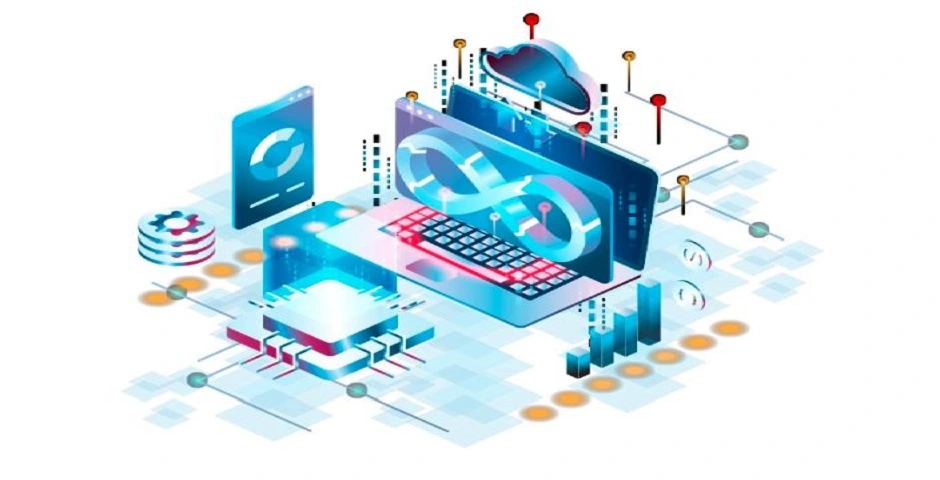
In the always-evolving landscape of software development, stopping ahead of the game requires leveraging new technologies and finishes. DevOps, a culture that emphasizes cooperation between development and movement teams, has been instrumental in achieving faster incident cycles and upgraded quality of software products.

As we step into 2024, let’s survey some of the cutting-edge DevOps forms that are shaping the future of software incidents.
Git, a distributed rendition control system, has become the keystone of modern software development, facilitating effective collaboration and code administration.
It offers countenance such as version control, issue following, continuous unification/continuous deployment (CI/CD), and listening, empowering groups to streamline their workflows. With GitLab, developers can surely manage repositories, hook up on projects, and automate the software delivery process.
GitHub is a widely adopted plank for hosting Git repositories and fostering open-source cooperation. It provides a foolproof interface for managing law repositories, tracking issues, and speeding code reviews. GitHub Actions allow automated workflows, while GitHub Packages allow for smooth package administration. These features make GitHub a favored choice for developers looking to influence and build upon open-source projects.
Bitbucket, a Git solution by Atlassian, offers a Git repository accommodating along with state-of-the-art features for code administration and collaboration. Teams can influence Bitbucket Pipelines for automating CI/CD pipelines, pull requests for code reviews, and integrations accompanying popular tools like Jira and Confluence.
With Bitbucket, organizations can create climbable and secure development environments while upholding code kind and consistency.
Chef is a powerful arrangement management tool that automates the process of directing and deploying infrastructure. It allows developers and sysadmins to define foundation as code, making it easy to configure, deploy, and manage servers. Chef follows an “Infrastructure as Code” approach, where infrastructure configurations are written as law scripts, enabling regularity and repeatability across environments.
One of the key features of Chef is its ability to delineate configurations in cookbooks and recipes, that can be version-regulated and shared among crew members. This guarantees that configurations are consistent across different stages of the software development lifecycle. Chef still provides a robust environment of cookbooks and plugins, making it easy to mix with other forms and technologies.
In 2024, Chef has continued to progress with new features and enhancements, such as revised scalability, better support for cloud environments, and reinforced security features. Its handy interface and extensive proof make it a well-known choice among DevOps professionals for directing complex infrastructures with ease.
Puppet is another superior configuration management finish that enables the automation of infrastructure arrangement and configuration. It follows an explanatory approach: Consumers define the desired state of their foundation, and Puppet ensures that the real state matches the desired state.
Puppet defines configurations using a rule-specific language called Puppet DSL, making it easy to use and write code. It supplies a centralized dashboard for monitoring and managing the foundation, making it easier to organize automation at scale. Puppet’s agent-located architecture ensures that configurations are used consistently across all knots in the infrastructure.
In 2024, Puppet introduced various new features to reinforce its capabilities, in a way that improved support for containerized environments, embellished reporting and data capabilities, and better integration accompanying cloud platforms. Its healthy support for diverse operating systems and cloud providers makes it a preferred choice for organizations looking to automate and control their infrastructure efficiently.
Ansible is a lightweight and easy-to-use computerization tool that simplifies the process of arrangement management, request deployment, and orchestration. Unlike Chef and Puppet, Ansible does not demand a master-slave architecture, making it easy to start and use. Ansible uses YAML-based playbooks to outline tasks and configurations, allowing users to mechanize complex workflows with ease.
One of the key benefits of Ansible is its agentless architecture, which eliminates the need to establish agents on remote plans. This makes it highly climbable and suitable for deploying configurations across abundant, heterogeneous environments. Ansible still provides a rich set of modules for merging with various forms and technologies, making it a versatile automation tool for DevOps crews.
In 2024, Ansible has seen significant growth in its consumer base, thanks to its unity and flexibility. It has introduced new appearances such as a netting-based dashboard for listening and managing computerization tasks, improved support for cloud-native technologies, and improved security appearance. Ansible’s ability to automate repetitious tasks and streamline complex workflows makes it a valuable advantage for organizations dealing with DevOps practices.
Maven is a powerful build automation finish that simplifies the build process and project administration in Java-based applications. In 2024, Maven continues to be a vital finish for managing reliances, building projects, and generating project reports.
Maven’s project object model (POM) supplies a standardized habit to define project configurations and dependencies and build characterizations. By utilizing Maven repositories, developers can easily approach and download project dependencies, lowering the hassle of managing libraries manually. Moreover, Maven plugins extend its service, enabling tasks to a degree of code compilation, experiment, packaging, and deployment expected automated.
Jenkins, an open-source automation server, plays an important role in permissive continuous integration and continued delivery (CI/CD) practices inside DevOps pipelines. With its extensible plugin environment and flexible architecture, Jenkins empowers crews to automate build, test, and arrangement processes efficiently.
In 2024, Jenkins features healthy support for pipelines as a rule, allowing teams to outline their build pipelines using Groovy scripts. Jenkins Pipelines authorize the modeling of complex workflows, unification with version control plans, and orchestration of tasks across diversified stages. Additionally, Jenkins offers integrations with various finishes and platforms, making it an adjustable choice for orchestrating DevOps workflows.
Docker has existed as a game-changer in the world of DevOps since its beginning, and it continues to lead the pack in 2024. Docker allows developers to package their requests and dependencies into inconsequential containers, ensuring constancy in development, testing, and arrangement environments. With Docker, teams can easily build, ship, and run requests across different environments, chief to faster delivery eras and increased flexibility.
Furthermore, Docker’s containerization science promotes scalability and efficiency by admitting applications to arrest isolated environments outside interfering with each other. This seclusion ensures that dependencies are encapsulated within the container, improving security and lowering compatibility issues.
In 2024, Docker proper to further enhance its appearance, with improvements in scalability, freedom, and integration capabilities, making it an essential tool for DevOps crews aiming to achieve unending integration and delivery.
Kubernetes, frequently abbreviated as K8s, is a strong open-source platform for automating the arrangement, scaling, and management of containerized uses. As organizations adopt containerization strategies, Kubernetes has arisen as the go-to tool for orchestrating complex bag environments accompanying efficiency and ease.
Kubernetes simplifies the process of directing clusters of containers by automating tasks such as measuring, load balancing, and self-curative. With its declarative approach to use management, Kubernetes allows planners to define their wanted states while the platform handles the implementation analyses, ensuring consistency and dependability across deployments.
In 2024, Kubernetes is poised to further progress, with enhancements in scalability, protection, multi-cloud support, and observability features. As a cornerstone of new DevOps practices, Kubernetes empowers teams to build flexible, scalable applications that can suit dynamic business necessities.
With its comprehensive series of services, Azure supports an agile and scalable foundation for development and operations groups to collaborate seamlessly. In 2024, Azure has further improved its capabilities in DevOps by contributing advanced features in the way that Azure DevOps Services, Azure DevTest Labs, and Azure Container Service.

Azure DevOps Services enable crews to plan, collaborate, and deliver software faster and more reliably. With features like beginning control, build automation and release administration, teams can streamline their incident workflows and achieve continuous unification and deployment. Azure DevTest Labs specify a self-service sandbox surroundings for developers and testers to fast create and deploy money for testing purposes while improving agility and output.
Azure Container Service allows organizations to organize containers at scale utilizing Kubernetes, Docker Swarm, or Mesosphere DC/OS. By leveraging containerization technology, teams can reach greater flexibility, portability, and efficiency in their use deployment processes. Overall, Azure’s cloud computing and storehouse solutions are integral to new DevOps practices, helping businesses accelerate their software delivery and deployment cycles.
Google Cloud Platform (GCP) is another chief cloud computing provider that offers a wide range of services tailor-made for DevOps practices. In 2024, GCP will continue to innovate and support cutting-edge forms for development and operations crews to collaborate effectively. GCP’s foundation services, in the way that Compute Engine, App Engine, and Kubernetes Engine, are highly scalable and trustworthy, making them ideal for modern DevOps workflows.
Compute Engine allows organizations to find virtual machines with customizable configurations for running requests and services. App Engine offers a fully trained platform for construction and deploying web applications outside worrying about infrastructure administration. Kubernetes Engine provides a strong container orchestration principle that simplifies the deployment and administration of containerized applications at scale.
GCP’s depository services, including Cloud Storage and Cloud SQL, offer secure and scalable storage solutions for DevOps crews to store and retrieve data efficiently. Cloud Storage provides an object depository that is highly feasible and durable, while Cloud SQL offers governed relational databases for seamless unification with DevOps workflows.
With GCP’s cloud computing and depository tools, organizations can realize faster time-to-display, improved collaboration, and reinforced application performance.
Monitoring, alerting, and occurrence response are fault-finding aspects of DevOps practices to ensure the dependability and performance of applications and aids. SignalFx, a leading observability terrace, offers advanced tools for real-time monitoring, alerting, and occurrence response in 2024. By leveraging telemetry data from various sources, SignalFx supports organizations with actionable insights to discover and resolve issues before they impact end-users proactively.
SignalFx’s monitoring powers enable teams to accumulate and visualize versification, traces, and logs from different systems and uses in a centralized dashboard. With customizable dashboards and real-period analytics, teams can gain visibility into their infrastructure and applications’ energy and performance. SignalFx’s alerting features allow teams to start notifications based on predefined thresholds or inconsistencies, ensuring appropriate responses to critical occurrences.
In terms of incident reaction, SignalFx provides cooperation tools for teams to coordinate and resolve occurrences effectively. With features like occurrence timelines, real-opportunity chat, and post-mortem analysis, groups can streamline their incident administration processes and learn from past occurrences to prevent future occurrences.
Effective ideas and collaboration are essential components of profitable DevOps practices, and Slack has emerged as a chief platform for enabling crews to connect, share information, and hook up seamlessly. With its instinctive interface, real-opportunity messaging capabilities, and far-reaching integrations, Slack enhances communication with team members and facilitates cross-functional cooperation.
In 2024, Slack is expected to continue innovating, with augmentations in workflow automation, project administration features, and integration skills. By providing a centralized center for communication, file sharing, and cooperation, Slack plays a crucial role in supporting transparency, effectiveness, and productivity within DevOps crews.
Amazon Web Services (AWS) remains a dominant player in the cloud calculating market, offering an inclusive suite of duties that empower organizations to build, redistribute, and scale applications with ease. In the sphere of DevOps, AWS provides a robust foundation for hosting uses, managing resources, and automating workflows, permissive teams to achieve better agility and efficiency in their happening and deployment processes.
AWS Cloud Computing and Storage services offer an expansive range of features, containing compute power, depository options, networking skills, and security tools, that pamper the diverse needs of DevOps groups. By leveraging AWS services, organizations can solve scalability, flexibility, and cost-effectiveness, while again benefiting from industry-superior security and dependability standards.
In 2024, AWS is expected to continue innovating, with augmentations in machine learning capabilities, serverless calculating options, and IoT integrations, further expanding allure offerings and hardening its position as a top choice for DevOps tooling.
AppDynamics is a superior application performance management (APM) and AIOps platform that provides physical-time insight into the performance of your applications and foundation. With its comprehensive listening and analytics capabilities, AppDynamics allows DevOps teams to quickly define and resolve performance bottlenecks, increase resource utilization, and guarantee seamless user knowledge.
One of the key features of AppDynamics is its active baselining functionality, which automatically establishes accomplishment baselines for your applications and detects anomalies in authentic time. This allows crews to proactively identify and address issues before they impact end consumers, resulting in improved uptime and dependability.
Furthermore, AppDynamics offers powerful diagnostics finishes that enable deep dive analysis into use code, database queries, and foundation components. By acquiring actionable insights into the root causes of efficiency issues, DevOps teams can rapidly especially to and remediate problems, thereby embellishing the overall quality and balance of their applications.
In addition to its listening and diagnostics capabilities, AppDynamics integrates seamlessly accompanying popular DevOps tools in the way that Jenkins, Docker, and Kubernetes, enable automated workflows and sleek deployments. By providing end-to-end visibility across the complete application stack, AppDynamics empowers teams to participate more effectively and drive continuous bettering in their development and operations processes.
Selenium has existed as a cornerstone in test automation for years, but in 2024, it has evolved to offer even more effective features. With the rise of artificial intelligence and machine intelligence, Selenium now incorporates astute testing competencies to improve test coverage and veracity.

Its integration with cloud experiment platforms enables groups to execute tests in parallel across multiple browsers and ploys, reducing experiment time significantly. Additionally, Selenium’s embellished reporting and analytics functionalities support valuable insights into test results, helping groups identify and resolve issues immediately.
As we look ahead to 2024, the DevOps tooling landscape is poised for continuous innovation and progress. By embracing these cutting-edge finishes organizations can empower their crews to collaborate more effectively, automate repetitive tasks, and drive unending improvement in software delivery.
Stay ahead of the curve by combining these advanced DevOps tools into your workflows and controlling the power of new technology to achieve functional excellence in the digital age. Contact Proxy Job Support now for more information.